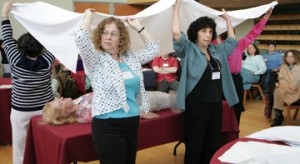It is hard to believe that it was just a few years ago when Hal Miller-Jacobs, a non-orthodox Jew, created “an inclusive Jewish burial society” for the Greater Boston area. The society has already made enormous strides for those in the non-orthodox Jewish community who wish to reclaim the traditional Jewish burial rites.
Millers-Jacobs’ journey began when his cousin passed away unexpectedly and he found himself thrown into the chaos of funeral planning. He played a large role in the oversight of the event and says he “wound up helping with [what is called] the tahara — the traditional preparation of the body for burial.” But in trying to volunteer for “his local Chevra Kadisha, or Jewish burial society,” he says he was suddenly “turned away” (likely because he is not an orthodox Jew). In turn, he has created an inclusive society with Judith Himber that he says makes it easier to “open this up to more people.” Rabbi Stuart Kelman of the Gamliel Institute says he sees things like Miller-Jacobs’ Hevra Kadisha society “as a major educational opportunity for the American Jewish community and frankly as a way for serving aging Baby Boomers.”
The idea of going through the traditional tahara preparations remained close to Miller-Jacobs’ heart–he still says it was one of the most moving experiences of his life. The tahara involves the “washing, cleaning and dressing [of] the body in a simple white shroud.” It is a powerful, symbolic act that requires real preparation and care for the loved one who has just passed. Many call it the “final kindness” done for a family member or loved one who has passed away. One Jewish site, which aims to make Jewish history and culture accessible, says that, “It is traditionally believed that God performed the work of the Chevra Kadisha for Moses, who died alone on Zayin Adar, the seventh day of the Hebrew month of Adar” when explaining the origins of the tahara ritual; ” Just as newborns are washed and dressed as they enter this world, so are the deceased cleansed, purified and dressed as they depart.”
“It is a powerful, symbolic act that requires real preparation and care for the loved one who has just passed.”
There have since been movements to found non-Orthodox Chevra Kadisha groups across the U.S. The last gathering for a training session in Boston at the community Hevra Kadisha attracted more than 100 people. “We think we’re doing something important, [by] addressing death openly and through the lens of Jewish tradition,” says one man, “[and hopefully it] counters the trend toward death denial in our culture.”
Read more posts on Jewish traditions:
- Jewish Views and Customs at the End-of-Life
- Jewish Tahara
- Book Review: Cremation or Burial? A Jewish View

 Traditional Jewish Burial Rights
Traditional Jewish Burial Rights




 First the Wealth Gap, Now the U.S. Has a Growing Health Gap
First the Wealth Gap, Now the U.S. Has a Growing Health Gap
 How to Comfort A Dying Loved One
How to Comfort A Dying Loved One
 Our Annual Seven Holiday Gifts for Someone Who Is Grieving, 2024 Edition
Our Annual Seven Holiday Gifts for Someone Who Is Grieving, 2024 Edition














